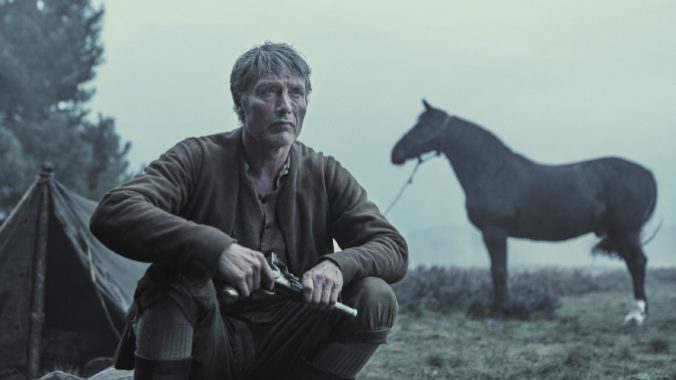Danish Historical Epic The Promised Land Finds Fertile Soil

There are few faces in Danish cinema as recognizable as Mads Mikkelsen, who gained international recognition for shedding bloody tears as a Bond villain in Casino Royale and won over a legion of fans as the titular brain-eater in Hannibal. But while his striking profile and chilling screen presence have led to him frequently being cast as the villain in Hollywood, he’s logged a long list of performances in his native country that span a much wider range of personas. The Promised Land is a Danish-German-Swedish co-production that sees the actor take on the type of complex, morally ambiguous figure he’s frequently embodied in his home country.
Mikkelsen plays Ludvig Kahlen, a retired military officer living in 18th-century Denmark who’s hellbent on cultivating the Jutland heath, a stretch of land considered impossible to farm. If he can accomplish this seemingly undoable task, he’s been promised a noble title, a goal he chases with obsessive resolve. But beyond taming this infertile landscape, he also must contend with Frederik de Schinkel (Simon Bennebjerg), a sadistic magistrate willing to spill blood to ensure he retains control over the region. As Kahlen spends every penny of his meager pension to cultivate this space, a stand-off brews between these men, each determined to get his way.
While The Promised Land largely takes place on a relatively tiny plot of dirt in the Danish boonies, its filmmaking lends this struggle an expansive, David-versus-Goliath slant. Cinematographer Rasmus Videbæk and director Nikolaj Arcel contrast the breadth of the Jutland countryside against the smallness of our protagonist’s enterprise as he cuts through vast shrubland and tills acidic soil in what initially feels like a futile and hubristic effort. For generations, this backdrop has been viewed as untameable, and the rough foliage that stretches into the distance doesn’t exactly indicate that greener pastures are ahead.
But of course, there wouldn’t be much of a film if this endeavor was completely hopeless, and as Kahlen inches towards success and burns through his savings to take on a larger crew of workers, tensions arise between our hero and his foe. The Promised Land may be a movie about agriculture, but there is a persistent undercurrent of danger from the anxiety that all this backbreaking labor could come undone at any moment. Being a farmer is brutal work in any era, and it doesn’t help when you have a powdered-wig-wearing sociopath breathing down your neck.
Bennebjerg’s de Schinkel is the type of hateable foil that makes us deeply want to see him hoisted with his own petard, a desire that helps drive the narrative. Bennebjerg captures the sniveling, unhinged qualities of a small man with a sizeable fortune who uses those around him to satisfy his whims or appease his anger, and his mistreatment of indentured serfs and serving girls who work under him works as an indictment for a feudal era where the whims of the powerful were particularly unchecked.
-

-

-

-

-

-

-

-

-

-

-

-

-

-

-

-

-

-

-

-

-

-

-

-

-

-

-

-

-

-

-

-

-

-

-

-

-

-

-

-








































